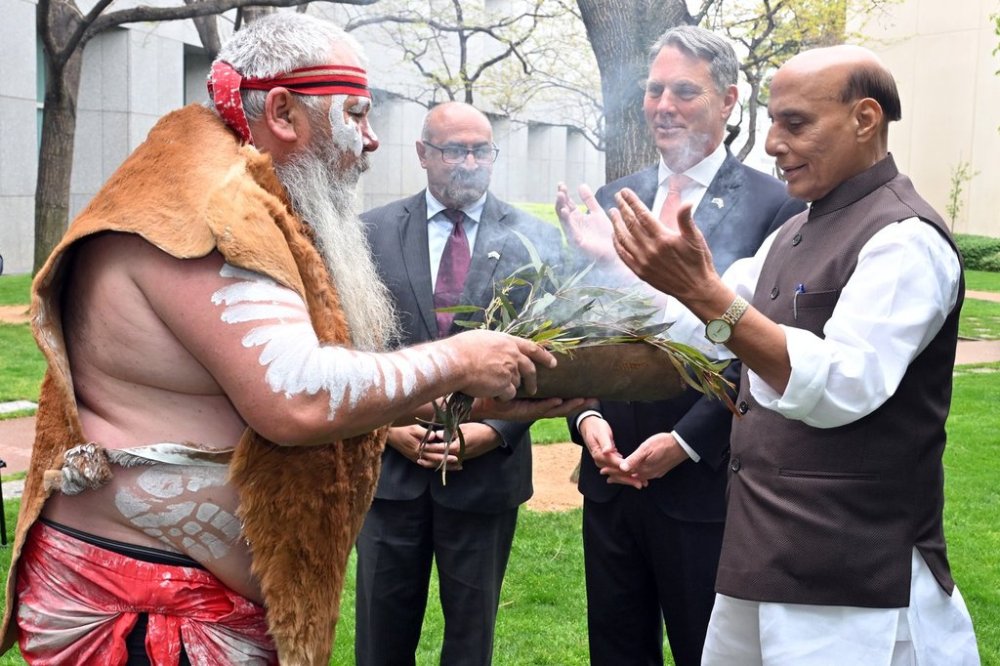India and Australia sign a security deal that includes military talks and submarine cooperation
Advertisement
Read this article for free:
or
Already have an account? Log in here »
To continue reading, please subscribe:
Monthly Digital Subscription
$0 for the first 4 weeks*
- Enjoy unlimited reading on winnipegfreepress.com
- Read the E-Edition, our digital replica newspaper
- Access News Break, our award-winning app
- Play interactive puzzles
*No charge for 4 weeks then price increases to the regular rate of $19.95 plus GST every four weeks. Offer available to new and qualified returning subscribers only. Cancel any time.
Monthly Digital Subscription
$4.99/week*
- Enjoy unlimited reading on winnipegfreepress.com
- Read the E-Edition, our digital replica newspaper
- Access News Break, our award-winning app
- Play interactive puzzles
*Billed as $19.95 plus GST every four weeks. Cancel any time.
To continue reading, please subscribe:
Add Free Press access to your Brandon Sun subscription for only an additional
$1 for the first 4 weeks*
*Your next subscription payment will increase by $1.00 and you will be charged $16.99 plus GST for four weeks. After four weeks, your payment will increase to $23.99 plus GST every four weeks.
Read unlimited articles for free today:
or
Already have an account? Log in here »
MELBOURNE, Australia (AP) — Australian and Indian defense ministers signed a new bilateral security deal Thursday that Australia said upholds Indo-Pacific stability.
Rajnath Singh has become the first Indian defense minister to visit Australia since 2013, his Australian counterpart Richard Marles said.
“Australia and India are top-tier security partners and our defense cooperation delivers practical effects to uphold Indo-Pacific stability,” Marles’ office said in a statement.

Marles and Singh signed an agreement that included establishing a forum for joint staff talks between the two militaries and submarine rescue cooperation.
“The bilateral arrangements that will be signed today reflect the significant growth in our defense partnership and our shared ambition for its future,” Marles said before the signing.
Closer defense relations became evident in July when India for the first time participated in the biennial Talisman Sabre multination military exercises in Australia.
Talisman Sabre began in 2005 as a joint exercise between the United States and Australia. This year, more than 35,000 military personnel from 19 nations took part.
India and Australia are linked with the United States and Japan through an alliance known as the Quad.
The four countries’ foreign minister met in Washington in July and agreed to expand their cooperation on maritime security in the Indo-Pacific.
Raji Rajagopalan, a senior fellow at the Australian Strategic Policy Institute think tank, said Singh’s visit to Australia was “highly significant” both symbolically and in practical value.
While an Indian defense minister had not visited Australia in 12 years, Marles had visited India for high-level meetings several times, she said.
Rajagopalan said India used such bilateral relationships to play a part in the strategic struggle between China and the United States in the Indo-Pacific.
“There is a lot of historical hesitancy that continues to influence how far India wants to get close to the U.S. But India is also pragmatic in recognizing that if China is India’s number one national security problem, it (India) also needs to work with the U.S. to manage the China problem,” Rajagopalan said.
“If India is sensitive about U.S.-India relations and getting close to the U.S. as a security partner, I think multilateralism and Quad also offer India some sort of a middle path in a sense. So India is not just working with the U.S., but working also with other partners; with Japan, with Australia, with France and other countries. It does give India a little bit more maneuverability in terms of strategic spacing and managing relationships,” she added.
Australia has been building bilateral security ties with its South Pacific island neighbors. Australia on Monday signed a defense treaty with Papua New Guinea that will integrate the nations’ defenses. It is Australia’s only alliance-level security pact other than the ANZUS Treaty signed with the United States and New Zealand in 1951.

